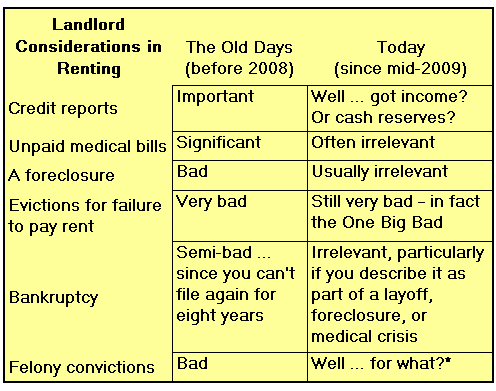
News frequently portrays inability to rent as one of the gloom-and-doom scenarios awaiting people who have been through a foreclosure. In my surveys around the U.S., I'm not seeing this, because the vast majority of people who have walked away from a mortgage are considered desirable tenants.
- You pay the rent on time.
- You don't trash the place or drive the other tenants crazy. To you readers who don't do these things, this means you don't party until 3 a.m. every night, don't put your fist through walls, cabinets, and ceilings, don't leave food garbage all over and create a cockroach invasion, and other even more amazing stuff.
- You don't deal drugs, especially crack and methamphetamine, which tend to lead to SWAT raids and serious property damage.
Some landlords are permanent dimbos, but most have wised up to the Great Recession. Though the "professional property managers" who manage multiple properties may be the last to clue in, most hands-on owners and managers of small apartment buildings or townhouse complexes are figuring out that if they want 95 percent + occupancy, they had better adjust to the "new normal." (And individuals renting out their own properties often just go by their own judgment.)
These are the results of interviews I did with landlords from 2008-2011, mostly in California and New York. This is the old/new deal:

* Convictions for marijuana have become irrelevant to many landlords. Crack dealing, methamphetamine dealing, and murder are still bad.
To add some perspective, my first interview with an apartment manager back in 2008 started with her saying, "If someone has a 400 FICO score but a good rental history, all we care about is the rental history." 400?! Back then I didn't know there was such a rating. They used to tell us we were losers if our FICO score was below 700! (Note that in the world of renting, 600 can be a very respectable score.)
Not that all owners or managers of rental properties care about credit reports. Many subscribe to proprietary rental databases that only track rental payment and eviction histories. And sure, while a golden 30-year record of on-time rent and no evictions beats a 10-year record of not renting at all, remember an eviction is a headache to any landlord other than the true slumlord. If you're new to the rental market, from their point of view at the worst you have a clean "rap sheet."
Another change in the "new normal" is the income/rent ratio. Younger managers are astonished when told that in the 1990s a "safe" ratio was that a renter should have gross income four times the rent. Today, when many people spend half their after-tax income on housing, before-tax income of 2.5 times rent is considered acceptable.
There will be some variation in ease of renting depending on geography. In yuppier areas with very few layoffs, you may be at the bottom of the list. A few miles away, in a townhouse complex where people don't have six-figure salaries, you could look very good to a landlord. (I was briefly a landlord in a mixed-income area, and believe me: after you've had a satanic cult try to rent your townhouse, neatly-dressed people who wash behind the ears look mighty attractive.)
There will also be variation according to local politics. In ultra-liberal towns, laws and judges strongly favor tenants over landlords, and it can take six months to evict a non-paying tenant. (In conservative areas landlords can often have the sheriff give delinquent tenants the bum's rush in three weeks.) So landlords in ultra-liberal areas may be cautious about renting to someone who has lived mortgage-free for a few months or years.
Those variations may mean shifting children's school districts if you live in a wealthy downtown area. If you're in the suburbs, even a wealthy suburb, there is usually an affordable townhouse complex within the same school district. Traditionally these were filled with the newly-divorced; now they are housing the newly-foreclosed as well.
You can find different rental criteria just by walking down the block and checking the next apartment building or townhouse complex, so one or two "rejections" isn't an immediate cause for concern. And if you don't fit the profile for commercial managers, you can turn to individuals or small investors renting out residential properties, since many of them place judgment well ahead of databases and formulas.
At the bottom line, if you are moving to a rental because your house was foreclosed, you are probably a respectable citizen from a landlord's point of view. After all, you did own a home, which means you probably take good care of property. That makes you a desirable tenant.